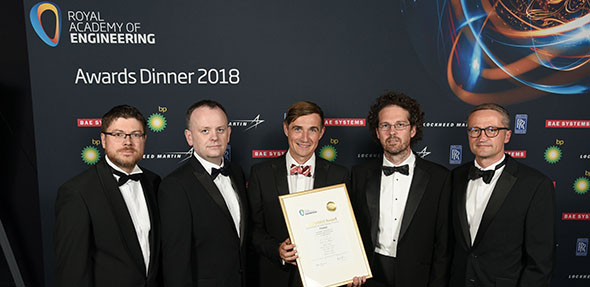Owlstone Medical, creators of a Breath Biopsy platform that could save the global healthcare system more than $1.5billion, has won the Royal Academy of Engineering’s 2018 MacRobert Award.
Owlstone Medical has now created a device that is dependable and non-intrusive, and has the potential to revolutionise the way we diagnose and treat a vast array of diseases. The societal benefit is clear to see, and I believe they could realise their vision of saving more than a billion dollars in global healthcare costs and saving hundreds of thousands of lives.
Dr Dame Sue Ion, Chair of the MacRobert Award judging panel
The unique Breath Biopsy® platform has the potential to save hundreds of thousands of lives. Owlstone Medical’s ReCIVA Breath Sampler has opened up the potential for earlier diagnosis and precision medicine across cancer, inflammatory disease and infectious disease.
Her Royal Highness The Princess Royal, as Royal Fellow of the Royal Academy of Engineering, presented the team of engineers from the Cambridge-based company with the MacRobert Award gold medal and a £50,000 prize at the Academy’s Awards Dinner at the Tower of London. The Award recognises outstanding innovation, tangible societal benefit and proven commercial success.
The winning team members are: Alumni Billy Boyle, Co-founder and CEO, and David Ruiz-Alonso, Co-founder and COO; as well as Max Allsworth, Chief Scientific Officer; Alastair Taylor, VP of Engineering; and Matthew Hart, VP of Research and Development.
Owlstone Medical has created the first platform capable of capturing breath samples and analysing them in a robust and reproducible way. These samples can be used to identify the unique chemical ‘biomarkers’ of a variety of diseases, also known as volatile organic compounds (VOCs), in human breath. As VOC levels change at the very earliest stages of disease and provide information on the current activity of cells and tissue, the breath samples could lead to earlier diagnosis of diseases such as cancer when treatments are more effective and more lives can be saved. Breath biomarkers also have the potential to revolutionise the way medicine is prescribed, as they could be used to monitor drug effectiveness and match patients to the correct treatment, and cut healthcare costs by lowering drug wastage.

Accepting the Award, from left: Alastair Taylor, Vice-President of Engineering; Max Allsworth, Chief Science Officer; Billy Boyle, Co-founder and CEO; David Ruiz-Alonso, Co-founder and Chief Operating Officer; Matthew Hart, Vice-President of Research and Development.
The ReCIVA Breath Sampler, inspired by discussions with more than 100 experts from design engineers to clinicians, is used to capture the samples in a non-invasive way, and these are then analysed through the company’s Breath Biopsy platform. The platform uses Owlstone’s microchip chemical sensor technology (FAIMS) to detect specific disease biomarkers with a high level of sensitivity. Developing a standardised method to collect and analyse breath biopsies means that Owlstone can build a robust, comparable Breath Biopsy Digital Biobank including thousands of breath VOC profiles matched to phenotype and overcome many of the historical challenges associated with the identification of VOCs and how these are associated with specific diseases.
Owlstone Medical is developing tests to diagnose lung and colorectal cancer, two of the most common cancer killers worldwide and is currently undertaking clinical trials with the NHS and Cancer Research. The company also supplies Breath Biopsy products and services to academic, clinical and pharma partners who want to develop breath based diagnostics for their own applications. GlaxoSmithKline recently chose to integrate the Breath Biopsy platform into the clinical development programme for one of the new drugs it is developing for respiratory disease, to assess whether it is possible to identify the right patient for the right treatment.
Dr Dame Sue Ion DBE FREng FRS, Chair of the MacRobert Award judging panel, said: "Owlstone Medical stood out because of the extraordinary engineering its breath sampler, and the associated breath biopsy platform, required to bring these technologies to life. The company has demonstrated exceptional innovation at every stage of development; from the mask used to help capture breath, the tubes that help collect the samples, to the software and hardware designed to ensure the tests are reliable and repeatable.
"Owlstone Medical has now created a device that is dependable and non-intrusive, and has the potential to revolutionise the way we diagnose and treat a vast array of diseases. The societal benefit is clear to see, and I believe they could realise their vision of saving more than a billion dollars in global healthcare costs and saving hundreds of thousands of lives."
Billy Boyle, co-founder and CEO at Owlstone Medical, said: "It’s a huge honour to have won the MacRobert Award and for the whole team to be recognised for their hard work over the last three years in developing the Breath Biopsy platform and establishing breath diagnostics as a new industry category. We know that in cancer, early detection is our greatest opportunity to save lives – our company mission is to save 100,000 lives and we won't stop until we achieve this."
About Owlstone Medical
Owlstone Inc was founded in 2004 as a spin-out from the Department of Engineering at the University of Cambridge. Owlstone Medical was spun out from Owlstone Inc in 2016 to develop and commercialise FAIMS in medical applications.
About the MacRobert Award
The MacRobert Award, run by the Royal Academy of Engineering, is the UK’s longest running and most prestigious award for engineering innovation. First presented in 1969, the Award has recognised the extraordinary potential of innovations that have changed the world we live in. Last year’s winner was the Cambridge-based team behind the Raspberry Pi, led by alumnus Dr Eben Upton CBE.

